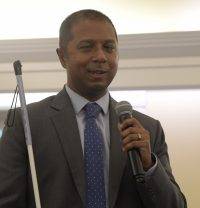Pavithran Challenges Ninja Participants

to NINJA participants.
"You can start being a mentor in any stage of your life,"
Sachin Pavithran, policy director at Utah State University’s Center for Persons with Disabilities, was the keynote speaker at last week’s sixth annual NINJA (New Ideas to Network Junior Advocates) conference banquet. The three-day conference prepares youth from Utah’s six Independent Living Centers to become self-advocates and take on leadership roles in their communities. In addition to classroom lectures and small group work, the youth played games on the quad, danced at the Ag Science patio, tackled the USU Ropes Course and, of course, enjoyed Aggie Ice Cream.
At the banquet Wednesday evening, Pavithran challenged conference participants by asking, “What are you going to do differently that you haven’t done before? What are you going to do to be the change for the others who are coming after you?
Pavithran talked about growing up in Dubai, where he did not encounter with people with disabilities. He began to lose his vision around age 4 or 5, and he was mostly blind by the time he was 14. His family did everything for him, he said, and he was surprised that they let him travel halfway around the world by himself to attend college at USU. He also talked about feeling embarrassed about having a disability.
“I did not want to accept that I was going blind,” he said. “I did every possible thing I could do to hide my blindness, and that was not a good thing. When I came to Utah State I became really good at faking it. That didn’t last for too long.
“It made a huge difference to me the day I accepted that I had a disability,” he continued. “That’s when things changed for me.”
After graduating from USU, Pavithran started working at the CPD, but refused to socialize. His supervisor at the time brought him a white cane and said, “You’re not coming back until you can use the cane.”
It was a pivotal moment in Pavithran’s life.
“To take a cane and walk out in public was not the easiest thing to do, because you’re telling everyone around you that you’re a blind person,” he said. “I started trying to figure out what this means to me in the real world.”
It meant, he found, that there were other people who had gone through the same things. “I didn’t have to figure it out on my own,” he said. “There are people who really want to help out and be mentors to you.”
Pavithran told the NINJA participants there were three important things for them to know.
First, he said, is accepting who you are. “Accept your disability. Accept what you’re able to do. Believe in yourself,” he said.
Next is finding role models and good mentors. “Find people you can trust and who can guide you in the things you want to do,” he said. “You don’t want people to baby you, you want people who will tell you what’s what. Having role models who will really push you is important.”
Lastly, be a mentor for someone else. “You can start being a mentor in any stage of your life,” he said. “At some point you have to give back. It’s a constant growing experience. It’s fun to be an advocate and it’s fun to be a mentor. There are so many things out there for you, so many possibilities, it’s up to you to own it.”

